Organizational Behaviour Report: Culture, Motivation, Teams, UK
VerifiedAdded on 2023/01/06
|18
|5808
|25
Report
AI Summary
This report provides an in-depth analysis of organizational behaviour principles, using Morrisons, a UK supermarket chain, as a case study. It explores the influence of organizational culture, power, and politics on employee behaviour and performance. The report examines Handy's model of organizational culture, Hofstede's cultural dimensions, and the impact of globalization and technology. It also delves into motivational theories, including Maslow's hierarchy of needs and Vroom's expectancy theory, to understand how to motivate teams and achieve company goals. Furthermore, it differentiates between effective and ineffective teams, analyzing the factors that contribute to team success. The report concludes with an evaluation of various concepts and theories in organizational behaviour, providing insights into how these concepts can be applied to improve organizational effectiveness and employee well-being. The report also touches upon organizational change and politics to give a holistic view of organizational behaviour.
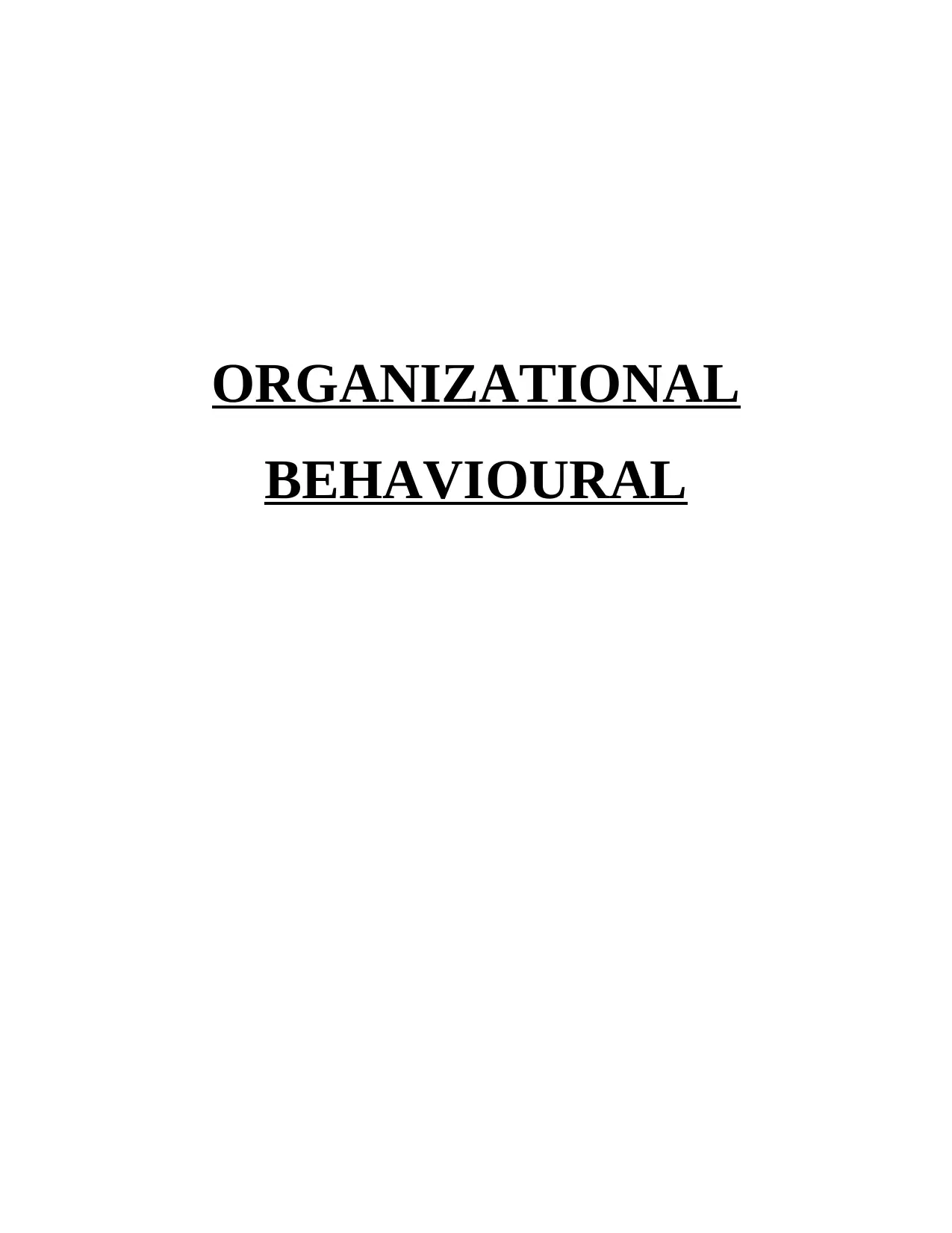
ORGANIZATIONAL
BEHAVIOURAL
BEHAVIOURAL
Paraphrase This Document
Need a fresh take? Get an instant paraphrase of this document with our AI Paraphraser
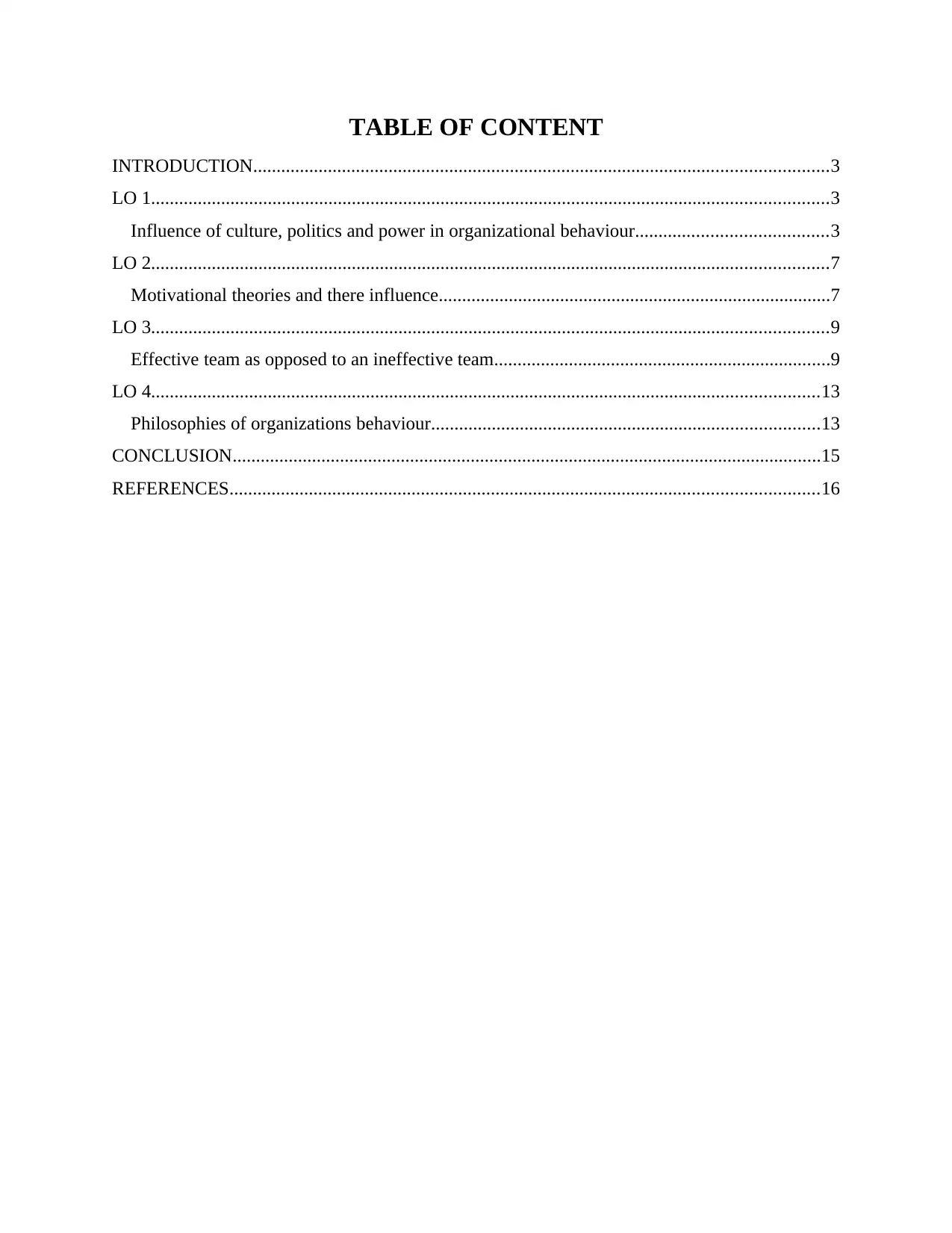
TABLE OF CONTENT
INTRODUCTION...........................................................................................................................3
LO 1.................................................................................................................................................3
Influence of culture, politics and power in organizational behaviour.........................................3
LO 2.................................................................................................................................................7
Motivational theories and there influence....................................................................................7
LO 3.................................................................................................................................................9
Effective team as opposed to an ineffective team........................................................................9
LO 4...............................................................................................................................................13
Philosophies of organizations behaviour...................................................................................13
CONCLUSION..............................................................................................................................15
REFERENCES..............................................................................................................................16
INTRODUCTION...........................................................................................................................3
LO 1.................................................................................................................................................3
Influence of culture, politics and power in organizational behaviour.........................................3
LO 2.................................................................................................................................................7
Motivational theories and there influence....................................................................................7
LO 3.................................................................................................................................................9
Effective team as opposed to an ineffective team........................................................................9
LO 4...............................................................................................................................................13
Philosophies of organizations behaviour...................................................................................13
CONCLUSION..............................................................................................................................15
REFERENCES..............................................................................................................................16

⊘ This is a preview!⊘
Do you want full access?
Subscribe today to unlock all pages.

Trusted by 1+ million students worldwide
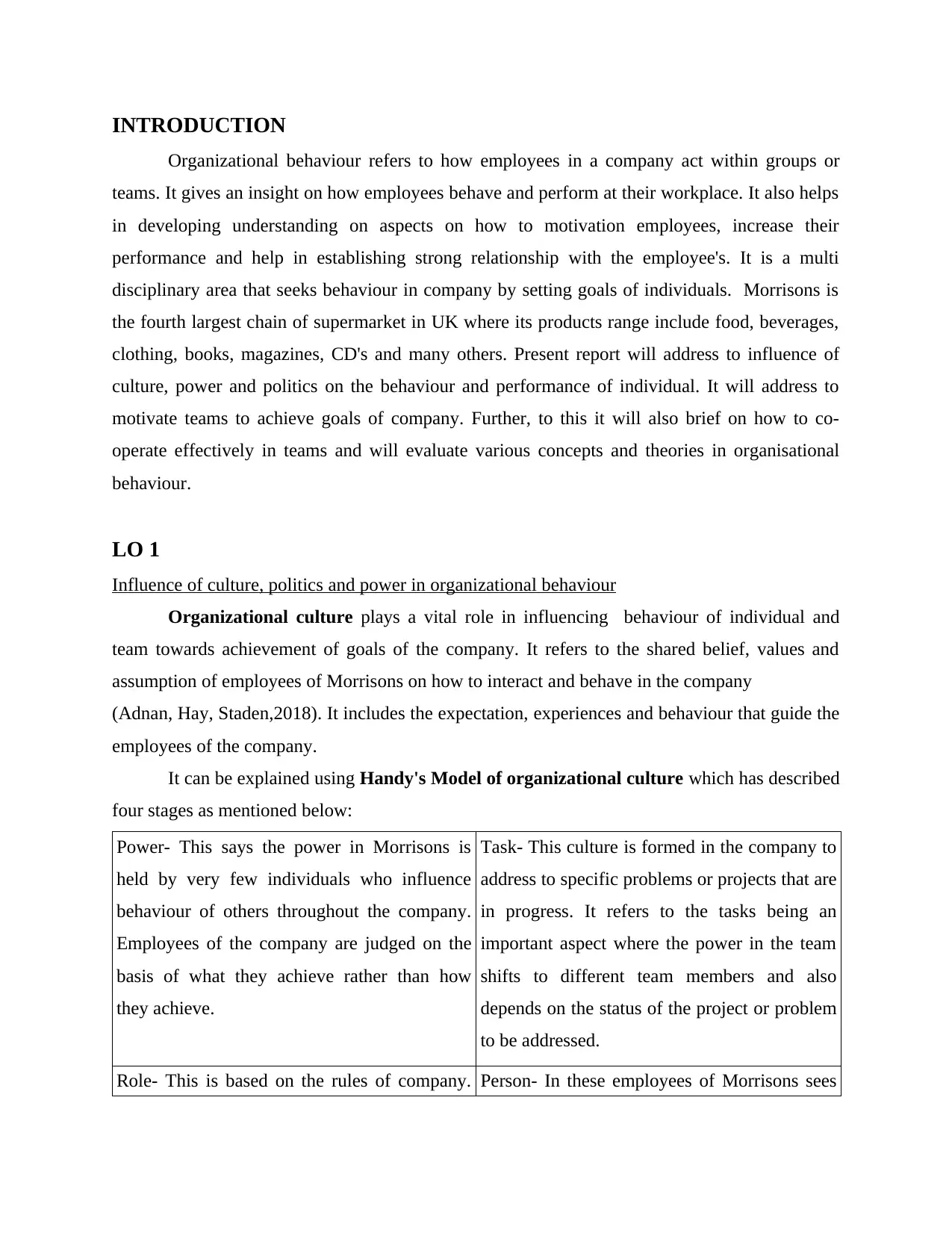
INTRODUCTION
Organizational behaviour refers to how employees in a company act within groups or
teams. It gives an insight on how employees behave and perform at their workplace. It also helps
in developing understanding on aspects on how to motivation employees, increase their
performance and help in establishing strong relationship with the employee's. It is a multi
disciplinary area that seeks behaviour in company by setting goals of individuals. Morrisons is
the fourth largest chain of supermarket in UK where its products range include food, beverages,
clothing, books, magazines, CD's and many others. Present report will address to influence of
culture, power and politics on the behaviour and performance of individual. It will address to
motivate teams to achieve goals of company. Further, to this it will also brief on how to co-
operate effectively in teams and will evaluate various concepts and theories in organisational
behaviour.
LO 1
Influence of culture, politics and power in organizational behaviour
Organizational culture plays a vital role in influencing behaviour of individual and
team towards achievement of goals of the company. It refers to the shared belief, values and
assumption of employees of Morrisons on how to interact and behave in the company
(Adnan, Hay, Staden,2018). It includes the expectation, experiences and behaviour that guide the
employees of the company.
It can be explained using Handy's Model of organizational culture which has described
four stages as mentioned below:
Power- This says the power in Morrisons is
held by very few individuals who influence
behaviour of others throughout the company.
Employees of the company are judged on the
basis of what they achieve rather than how
they achieve.
Task- This culture is formed in the company to
address to specific problems or projects that are
in progress. It refers to the tasks being an
important aspect where the power in the team
shifts to different team members and also
depends on the status of the project or problem
to be addressed.
Role- This is based on the rules of company. Person- In these employees of Morrisons sees
Organizational behaviour refers to how employees in a company act within groups or
teams. It gives an insight on how employees behave and perform at their workplace. It also helps
in developing understanding on aspects on how to motivation employees, increase their
performance and help in establishing strong relationship with the employee's. It is a multi
disciplinary area that seeks behaviour in company by setting goals of individuals. Morrisons is
the fourth largest chain of supermarket in UK where its products range include food, beverages,
clothing, books, magazines, CD's and many others. Present report will address to influence of
culture, power and politics on the behaviour and performance of individual. It will address to
motivate teams to achieve goals of company. Further, to this it will also brief on how to co-
operate effectively in teams and will evaluate various concepts and theories in organisational
behaviour.
LO 1
Influence of culture, politics and power in organizational behaviour
Organizational culture plays a vital role in influencing behaviour of individual and
team towards achievement of goals of the company. It refers to the shared belief, values and
assumption of employees of Morrisons on how to interact and behave in the company
(Adnan, Hay, Staden,2018). It includes the expectation, experiences and behaviour that guide the
employees of the company.
It can be explained using Handy's Model of organizational culture which has described
four stages as mentioned below:
Power- This says the power in Morrisons is
held by very few individuals who influence
behaviour of others throughout the company.
Employees of the company are judged on the
basis of what they achieve rather than how
they achieve.
Task- This culture is formed in the company to
address to specific problems or projects that are
in progress. It refers to the tasks being an
important aspect where the power in the team
shifts to different team members and also
depends on the status of the project or problem
to be addressed.
Role- This is based on the rules of company. Person- In these employees of Morrisons sees
Paraphrase This Document
Need a fresh take? Get an instant paraphrase of this document with our AI Paraphraser
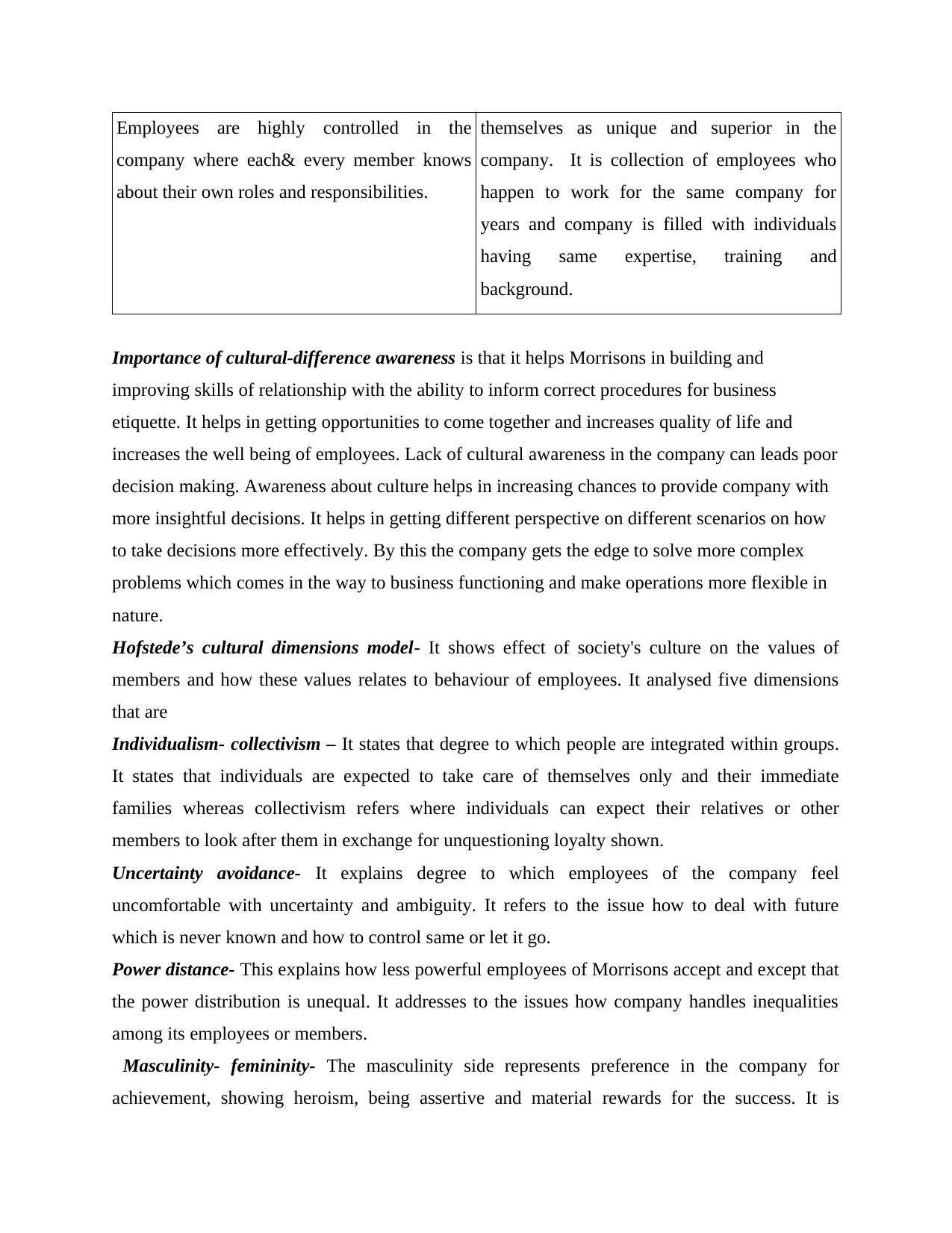
Employees are highly controlled in the
company where each& every member knows
about their own roles and responsibilities.
themselves as unique and superior in the
company. It is collection of employees who
happen to work for the same company for
years and company is filled with individuals
having same expertise, training and
background.
Importance of cultural-difference awareness is that it helps Morrisons in building and
improving skills of relationship with the ability to inform correct procedures for business
etiquette. It helps in getting opportunities to come together and increases quality of life and
increases the well being of employees. Lack of cultural awareness in the company can leads poor
decision making. Awareness about culture helps in increasing chances to provide company with
more insightful decisions. It helps in getting different perspective on different scenarios on how
to take decisions more effectively. By this the company gets the edge to solve more complex
problems which comes in the way to business functioning and make operations more flexible in
nature.
Hofstede’s cultural dimensions model- It shows effect of society's culture on the values of
members and how these values relates to behaviour of employees. It analysed five dimensions
that are
Individualism- collectivism – It states that degree to which people are integrated within groups.
It states that individuals are expected to take care of themselves only and their immediate
families whereas collectivism refers where individuals can expect their relatives or other
members to look after them in exchange for unquestioning loyalty shown.
Uncertainty avoidance- It explains degree to which employees of the company feel
uncomfortable with uncertainty and ambiguity. It refers to the issue how to deal with future
which is never known and how to control same or let it go.
Power distance- This explains how less powerful employees of Morrisons accept and except that
the power distribution is unequal. It addresses to the issues how company handles inequalities
among its employees or members.
Masculinity- femininity- The masculinity side represents preference in the company for
achievement, showing heroism, being assertive and material rewards for the success. It is
company where each& every member knows
about their own roles and responsibilities.
themselves as unique and superior in the
company. It is collection of employees who
happen to work for the same company for
years and company is filled with individuals
having same expertise, training and
background.
Importance of cultural-difference awareness is that it helps Morrisons in building and
improving skills of relationship with the ability to inform correct procedures for business
etiquette. It helps in getting opportunities to come together and increases quality of life and
increases the well being of employees. Lack of cultural awareness in the company can leads poor
decision making. Awareness about culture helps in increasing chances to provide company with
more insightful decisions. It helps in getting different perspective on different scenarios on how
to take decisions more effectively. By this the company gets the edge to solve more complex
problems which comes in the way to business functioning and make operations more flexible in
nature.
Hofstede’s cultural dimensions model- It shows effect of society's culture on the values of
members and how these values relates to behaviour of employees. It analysed five dimensions
that are
Individualism- collectivism – It states that degree to which people are integrated within groups.
It states that individuals are expected to take care of themselves only and their immediate
families whereas collectivism refers where individuals can expect their relatives or other
members to look after them in exchange for unquestioning loyalty shown.
Uncertainty avoidance- It explains degree to which employees of the company feel
uncomfortable with uncertainty and ambiguity. It refers to the issue how to deal with future
which is never known and how to control same or let it go.
Power distance- This explains how less powerful employees of Morrisons accept and except that
the power distribution is unequal. It addresses to the issues how company handles inequalities
among its employees or members.
Masculinity- femininity- The masculinity side represents preference in the company for
achievement, showing heroism, being assertive and material rewards for the success. It is
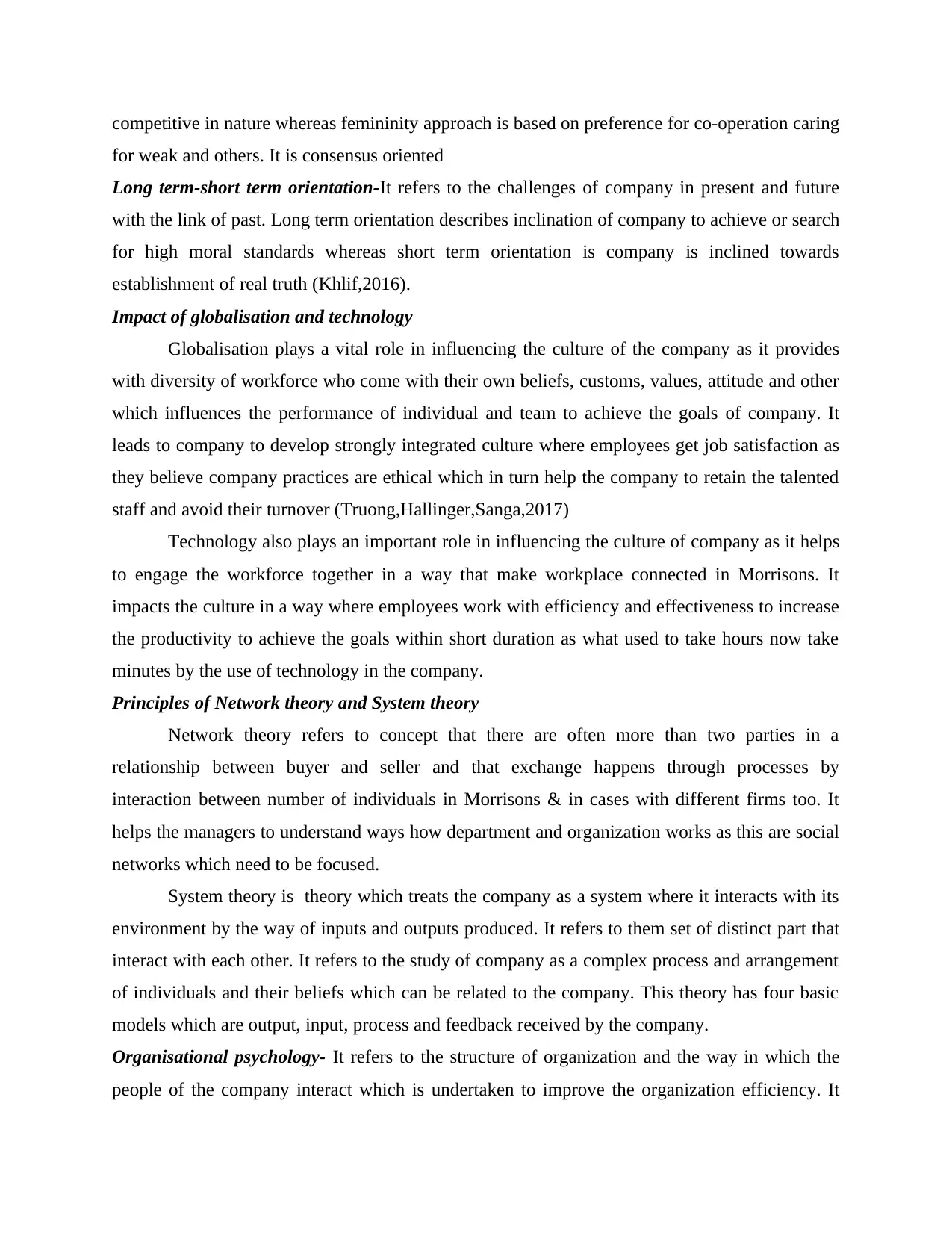
competitive in nature whereas femininity approach is based on preference for co-operation caring
for weak and others. It is consensus oriented
Long term-short term orientation-It refers to the challenges of company in present and future
with the link of past. Long term orientation describes inclination of company to achieve or search
for high moral standards whereas short term orientation is company is inclined towards
establishment of real truth (Khlif,2016).
Impact of globalisation and technology
Globalisation plays a vital role in influencing the culture of the company as it provides
with diversity of workforce who come with their own beliefs, customs, values, attitude and other
which influences the performance of individual and team to achieve the goals of company. It
leads to company to develop strongly integrated culture where employees get job satisfaction as
they believe company practices are ethical which in turn help the company to retain the talented
staff and avoid their turnover (Truong,Hallinger,Sanga,2017)
Technology also plays an important role in influencing the culture of company as it helps
to engage the workforce together in a way that make workplace connected in Morrisons. It
impacts the culture in a way where employees work with efficiency and effectiveness to increase
the productivity to achieve the goals within short duration as what used to take hours now take
minutes by the use of technology in the company.
Principles of Network theory and System theory
Network theory refers to concept that there are often more than two parties in a
relationship between buyer and seller and that exchange happens through processes by
interaction between number of individuals in Morrisons & in cases with different firms too. It
helps the managers to understand ways how department and organization works as this are social
networks which need to be focused.
System theory is theory which treats the company as a system where it interacts with its
environment by the way of inputs and outputs produced. It refers to them set of distinct part that
interact with each other. It refers to the study of company as a complex process and arrangement
of individuals and their beliefs which can be related to the company. This theory has four basic
models which are output, input, process and feedback received by the company.
Organisational psychology- It refers to the structure of organization and the way in which the
people of the company interact which is undertaken to improve the organization efficiency. It
for weak and others. It is consensus oriented
Long term-short term orientation-It refers to the challenges of company in present and future
with the link of past. Long term orientation describes inclination of company to achieve or search
for high moral standards whereas short term orientation is company is inclined towards
establishment of real truth (Khlif,2016).
Impact of globalisation and technology
Globalisation plays a vital role in influencing the culture of the company as it provides
with diversity of workforce who come with their own beliefs, customs, values, attitude and other
which influences the performance of individual and team to achieve the goals of company. It
leads to company to develop strongly integrated culture where employees get job satisfaction as
they believe company practices are ethical which in turn help the company to retain the talented
staff and avoid their turnover (Truong,Hallinger,Sanga,2017)
Technology also plays an important role in influencing the culture of company as it helps
to engage the workforce together in a way that make workplace connected in Morrisons. It
impacts the culture in a way where employees work with efficiency and effectiveness to increase
the productivity to achieve the goals within short duration as what used to take hours now take
minutes by the use of technology in the company.
Principles of Network theory and System theory
Network theory refers to concept that there are often more than two parties in a
relationship between buyer and seller and that exchange happens through processes by
interaction between number of individuals in Morrisons & in cases with different firms too. It
helps the managers to understand ways how department and organization works as this are social
networks which need to be focused.
System theory is theory which treats the company as a system where it interacts with its
environment by the way of inputs and outputs produced. It refers to them set of distinct part that
interact with each other. It refers to the study of company as a complex process and arrangement
of individuals and their beliefs which can be related to the company. This theory has four basic
models which are output, input, process and feedback received by the company.
Organisational psychology- It refers to the structure of organization and the way in which the
people of the company interact which is undertaken to improve the organization efficiency. It
⊘ This is a preview!⊘
Do you want full access?
Subscribe today to unlock all pages.

Trusted by 1+ million students worldwide
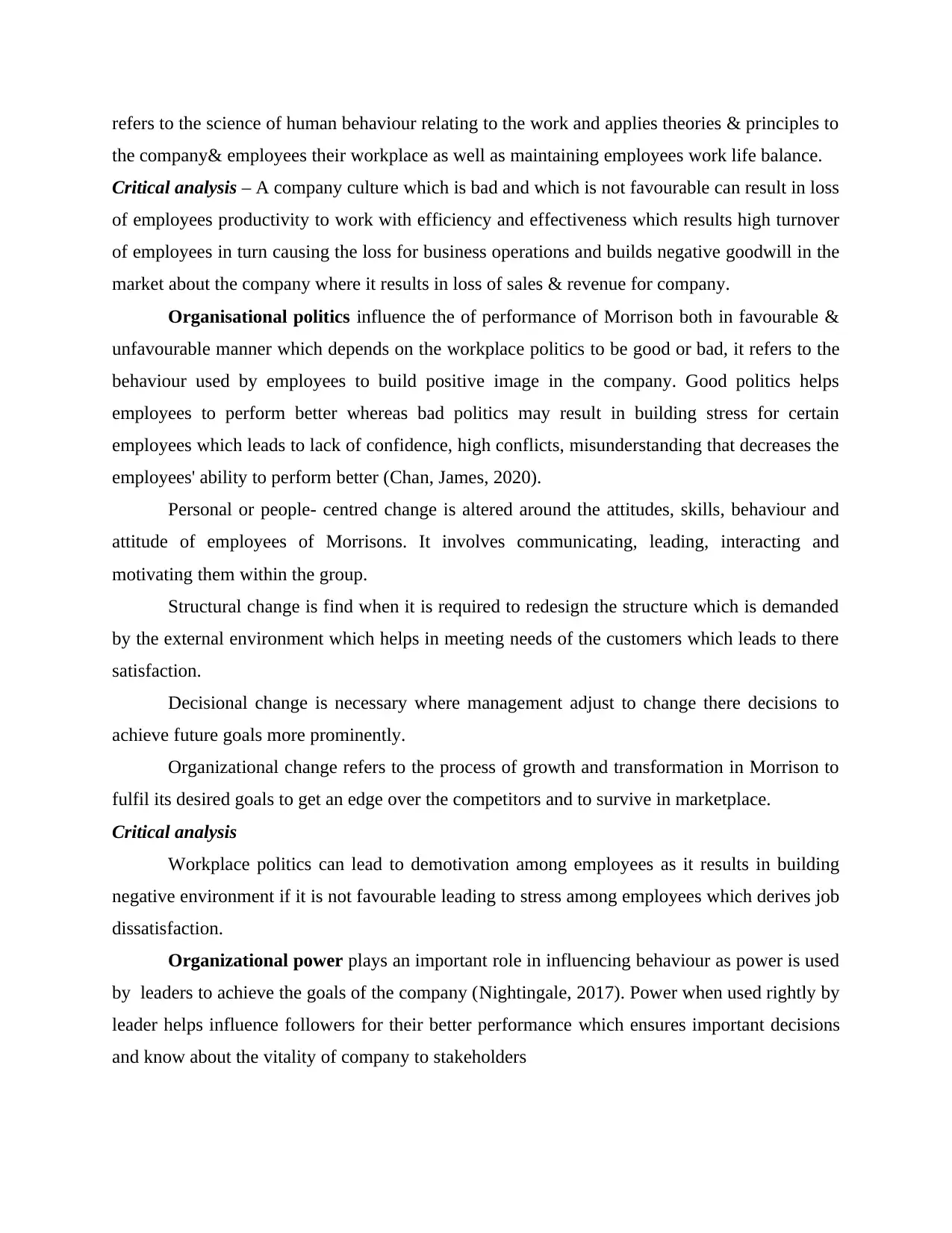
refers to the science of human behaviour relating to the work and applies theories & principles to
the company& employees their workplace as well as maintaining employees work life balance.
Critical analysis – A company culture which is bad and which is not favourable can result in loss
of employees productivity to work with efficiency and effectiveness which results high turnover
of employees in turn causing the loss for business operations and builds negative goodwill in the
market about the company where it results in loss of sales & revenue for company.
Organisational politics influence the of performance of Morrison both in favourable &
unfavourable manner which depends on the workplace politics to be good or bad, it refers to the
behaviour used by employees to build positive image in the company. Good politics helps
employees to perform better whereas bad politics may result in building stress for certain
employees which leads to lack of confidence, high conflicts, misunderstanding that decreases the
employees' ability to perform better (Chan, James, 2020).
Personal or people- centred change is altered around the attitudes, skills, behaviour and
attitude of employees of Morrisons. It involves communicating, leading, interacting and
motivating them within the group.
Structural change is find when it is required to redesign the structure which is demanded
by the external environment which helps in meeting needs of the customers which leads to there
satisfaction.
Decisional change is necessary where management adjust to change there decisions to
achieve future goals more prominently.
Organizational change refers to the process of growth and transformation in Morrison to
fulfil its desired goals to get an edge over the competitors and to survive in marketplace.
Critical analysis
Workplace politics can lead to demotivation among employees as it results in building
negative environment if it is not favourable leading to stress among employees which derives job
dissatisfaction.
Organizational power plays an important role in influencing behaviour as power is used
by leaders to achieve the goals of the company (Nightingale, 2017). Power when used rightly by
leader helps influence followers for their better performance which ensures important decisions
and know about the vitality of company to stakeholders
the company& employees their workplace as well as maintaining employees work life balance.
Critical analysis – A company culture which is bad and which is not favourable can result in loss
of employees productivity to work with efficiency and effectiveness which results high turnover
of employees in turn causing the loss for business operations and builds negative goodwill in the
market about the company where it results in loss of sales & revenue for company.
Organisational politics influence the of performance of Morrison both in favourable &
unfavourable manner which depends on the workplace politics to be good or bad, it refers to the
behaviour used by employees to build positive image in the company. Good politics helps
employees to perform better whereas bad politics may result in building stress for certain
employees which leads to lack of confidence, high conflicts, misunderstanding that decreases the
employees' ability to perform better (Chan, James, 2020).
Personal or people- centred change is altered around the attitudes, skills, behaviour and
attitude of employees of Morrisons. It involves communicating, leading, interacting and
motivating them within the group.
Structural change is find when it is required to redesign the structure which is demanded
by the external environment which helps in meeting needs of the customers which leads to there
satisfaction.
Decisional change is necessary where management adjust to change there decisions to
achieve future goals more prominently.
Organizational change refers to the process of growth and transformation in Morrison to
fulfil its desired goals to get an edge over the competitors and to survive in marketplace.
Critical analysis
Workplace politics can lead to demotivation among employees as it results in building
negative environment if it is not favourable leading to stress among employees which derives job
dissatisfaction.
Organizational power plays an important role in influencing behaviour as power is used
by leaders to achieve the goals of the company (Nightingale, 2017). Power when used rightly by
leader helps influence followers for their better performance which ensures important decisions
and know about the vitality of company to stakeholders
Paraphrase This Document
Need a fresh take? Get an instant paraphrase of this document with our AI Paraphraser
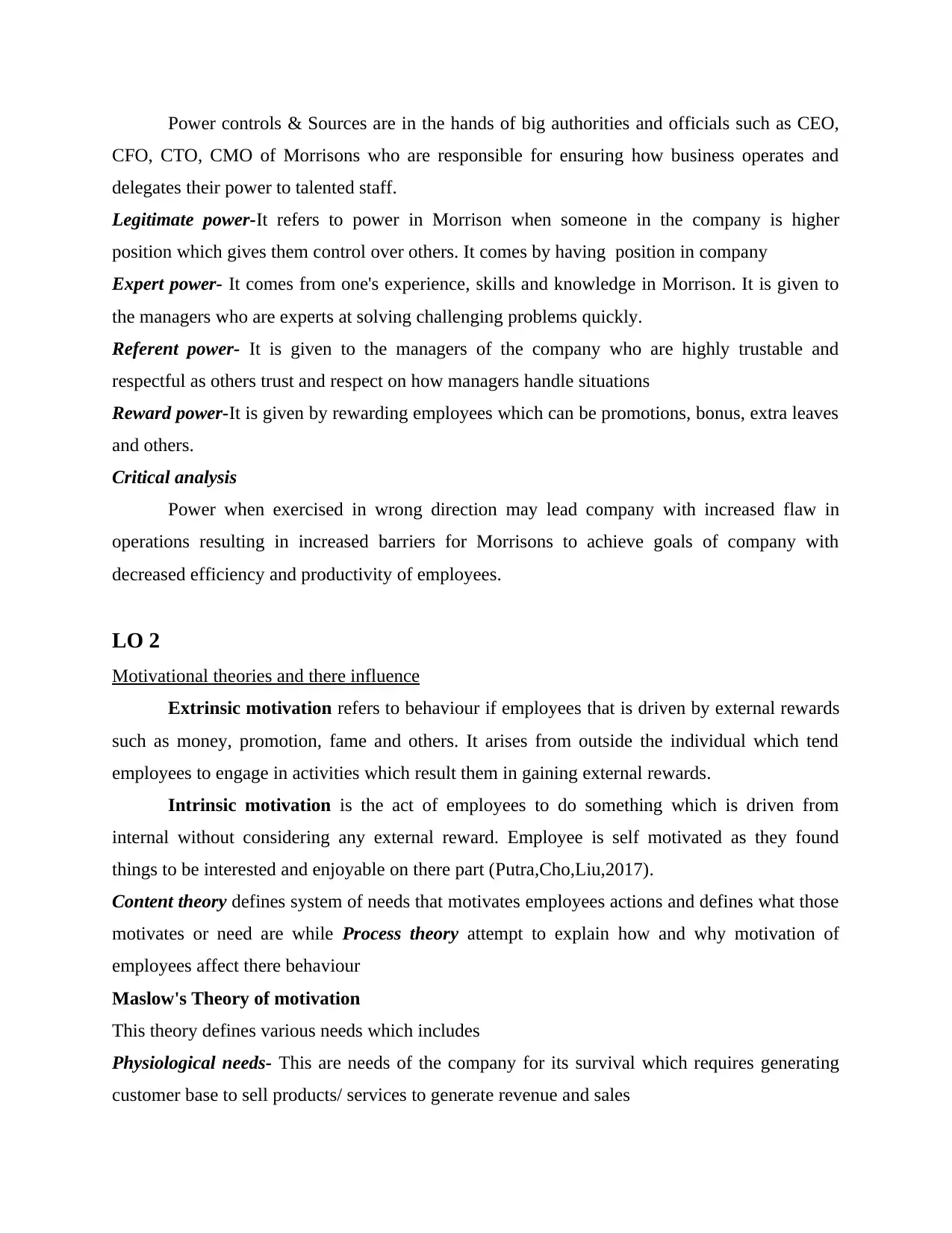
Power controls & Sources are in the hands of big authorities and officials such as CEO,
CFO, CTO, CMO of Morrisons who are responsible for ensuring how business operates and
delegates their power to talented staff.
Legitimate power-It refers to power in Morrison when someone in the company is higher
position which gives them control over others. It comes by having position in company
Expert power- It comes from one's experience, skills and knowledge in Morrison. It is given to
the managers who are experts at solving challenging problems quickly.
Referent power- It is given to the managers of the company who are highly trustable and
respectful as others trust and respect on how managers handle situations
Reward power-It is given by rewarding employees which can be promotions, bonus, extra leaves
and others.
Critical analysis
Power when exercised in wrong direction may lead company with increased flaw in
operations resulting in increased barriers for Morrisons to achieve goals of company with
decreased efficiency and productivity of employees.
LO 2
Motivational theories and there influence
Extrinsic motivation refers to behaviour if employees that is driven by external rewards
such as money, promotion, fame and others. It arises from outside the individual which tend
employees to engage in activities which result them in gaining external rewards.
Intrinsic motivation is the act of employees to do something which is driven from
internal without considering any external reward. Employee is self motivated as they found
things to be interested and enjoyable on there part (Putra,Cho,Liu,2017).
Content theory defines system of needs that motivates employees actions and defines what those
motivates or need are while Process theory attempt to explain how and why motivation of
employees affect there behaviour
Maslow's Theory of motivation
This theory defines various needs which includes
Physiological needs- This are needs of the company for its survival which requires generating
customer base to sell products/ services to generate revenue and sales
CFO, CTO, CMO of Morrisons who are responsible for ensuring how business operates and
delegates their power to talented staff.
Legitimate power-It refers to power in Morrison when someone in the company is higher
position which gives them control over others. It comes by having position in company
Expert power- It comes from one's experience, skills and knowledge in Morrison. It is given to
the managers who are experts at solving challenging problems quickly.
Referent power- It is given to the managers of the company who are highly trustable and
respectful as others trust and respect on how managers handle situations
Reward power-It is given by rewarding employees which can be promotions, bonus, extra leaves
and others.
Critical analysis
Power when exercised in wrong direction may lead company with increased flaw in
operations resulting in increased barriers for Morrisons to achieve goals of company with
decreased efficiency and productivity of employees.
LO 2
Motivational theories and there influence
Extrinsic motivation refers to behaviour if employees that is driven by external rewards
such as money, promotion, fame and others. It arises from outside the individual which tend
employees to engage in activities which result them in gaining external rewards.
Intrinsic motivation is the act of employees to do something which is driven from
internal without considering any external reward. Employee is self motivated as they found
things to be interested and enjoyable on there part (Putra,Cho,Liu,2017).
Content theory defines system of needs that motivates employees actions and defines what those
motivates or need are while Process theory attempt to explain how and why motivation of
employees affect there behaviour
Maslow's Theory of motivation
This theory defines various needs which includes
Physiological needs- This are needs of the company for its survival which requires generating
customer base to sell products/ services to generate revenue and sales
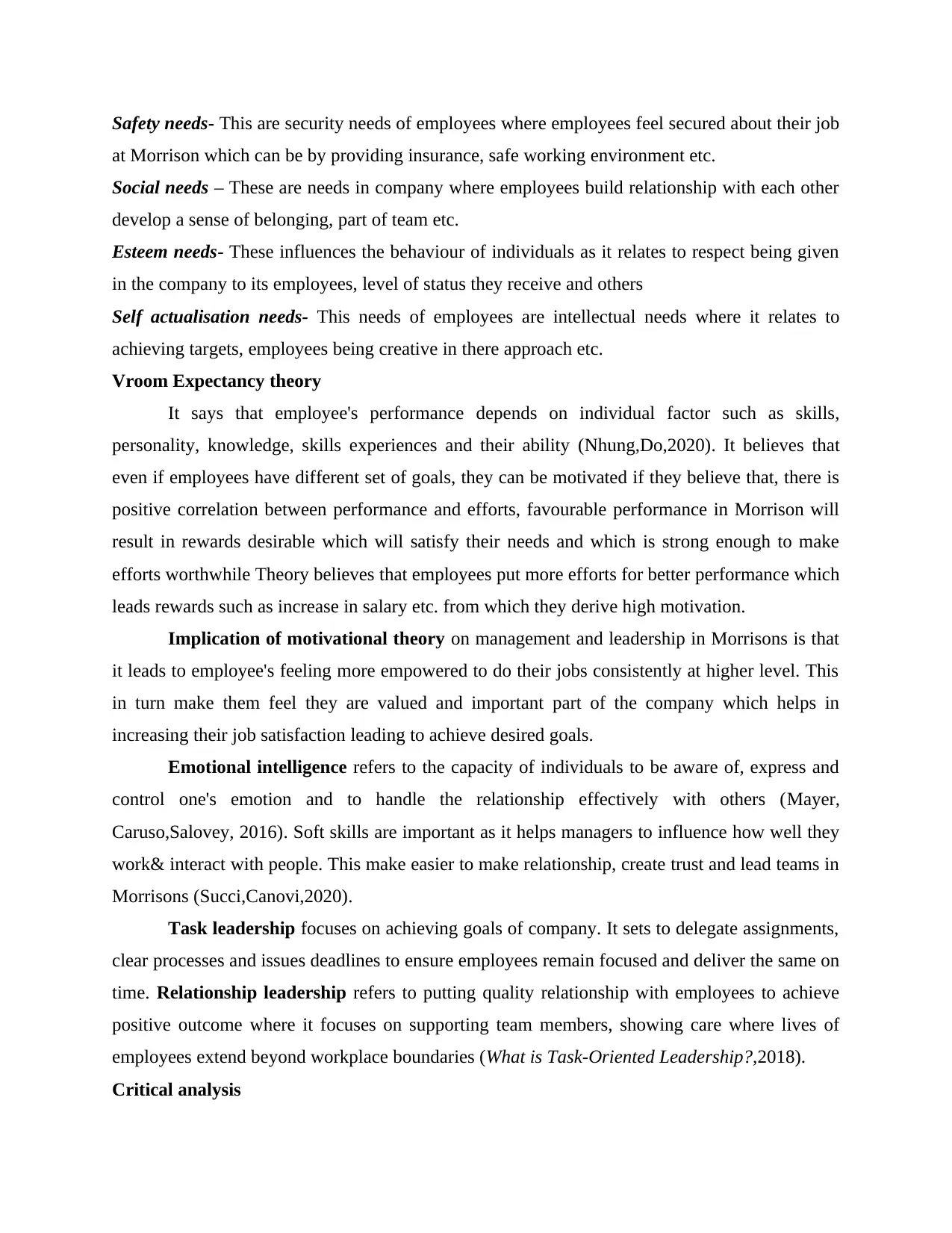
Safety needs- This are security needs of employees where employees feel secured about their job
at Morrison which can be by providing insurance, safe working environment etc.
Social needs – These are needs in company where employees build relationship with each other
develop a sense of belonging, part of team etc.
Esteem needs- These influences the behaviour of individuals as it relates to respect being given
in the company to its employees, level of status they receive and others
Self actualisation needs- This needs of employees are intellectual needs where it relates to
achieving targets, employees being creative in there approach etc.
Vroom Expectancy theory
It says that employee's performance depends on individual factor such as skills,
personality, knowledge, skills experiences and their ability (Nhung,Do,2020). It believes that
even if employees have different set of goals, they can be motivated if they believe that, there is
positive correlation between performance and efforts, favourable performance in Morrison will
result in rewards desirable which will satisfy their needs and which is strong enough to make
efforts worthwhile Theory believes that employees put more efforts for better performance which
leads rewards such as increase in salary etc. from which they derive high motivation.
Implication of motivational theory on management and leadership in Morrisons is that
it leads to employee's feeling more empowered to do their jobs consistently at higher level. This
in turn make them feel they are valued and important part of the company which helps in
increasing their job satisfaction leading to achieve desired goals.
Emotional intelligence refers to the capacity of individuals to be aware of, express and
control one's emotion and to handle the relationship effectively with others (Mayer,
Caruso,Salovey, 2016). Soft skills are important as it helps managers to influence how well they
work& interact with people. This make easier to make relationship, create trust and lead teams in
Morrisons (Succi,Canovi,2020).
Task leadership focuses on achieving goals of company. It sets to delegate assignments,
clear processes and issues deadlines to ensure employees remain focused and deliver the same on
time. Relationship leadership refers to putting quality relationship with employees to achieve
positive outcome where it focuses on supporting team members, showing care where lives of
employees extend beyond workplace boundaries (What is Task-Oriented Leadership?,2018).
Critical analysis
at Morrison which can be by providing insurance, safe working environment etc.
Social needs – These are needs in company where employees build relationship with each other
develop a sense of belonging, part of team etc.
Esteem needs- These influences the behaviour of individuals as it relates to respect being given
in the company to its employees, level of status they receive and others
Self actualisation needs- This needs of employees are intellectual needs where it relates to
achieving targets, employees being creative in there approach etc.
Vroom Expectancy theory
It says that employee's performance depends on individual factor such as skills,
personality, knowledge, skills experiences and their ability (Nhung,Do,2020). It believes that
even if employees have different set of goals, they can be motivated if they believe that, there is
positive correlation between performance and efforts, favourable performance in Morrison will
result in rewards desirable which will satisfy their needs and which is strong enough to make
efforts worthwhile Theory believes that employees put more efforts for better performance which
leads rewards such as increase in salary etc. from which they derive high motivation.
Implication of motivational theory on management and leadership in Morrisons is that
it leads to employee's feeling more empowered to do their jobs consistently at higher level. This
in turn make them feel they are valued and important part of the company which helps in
increasing their job satisfaction leading to achieve desired goals.
Emotional intelligence refers to the capacity of individuals to be aware of, express and
control one's emotion and to handle the relationship effectively with others (Mayer,
Caruso,Salovey, 2016). Soft skills are important as it helps managers to influence how well they
work& interact with people. This make easier to make relationship, create trust and lead teams in
Morrisons (Succi,Canovi,2020).
Task leadership focuses on achieving goals of company. It sets to delegate assignments,
clear processes and issues deadlines to ensure employees remain focused and deliver the same on
time. Relationship leadership refers to putting quality relationship with employees to achieve
positive outcome where it focuses on supporting team members, showing care where lives of
employees extend beyond workplace boundaries (What is Task-Oriented Leadership?,2018).
Critical analysis
⊘ This is a preview!⊘
Do you want full access?
Subscribe today to unlock all pages.

Trusted by 1+ million students worldwide
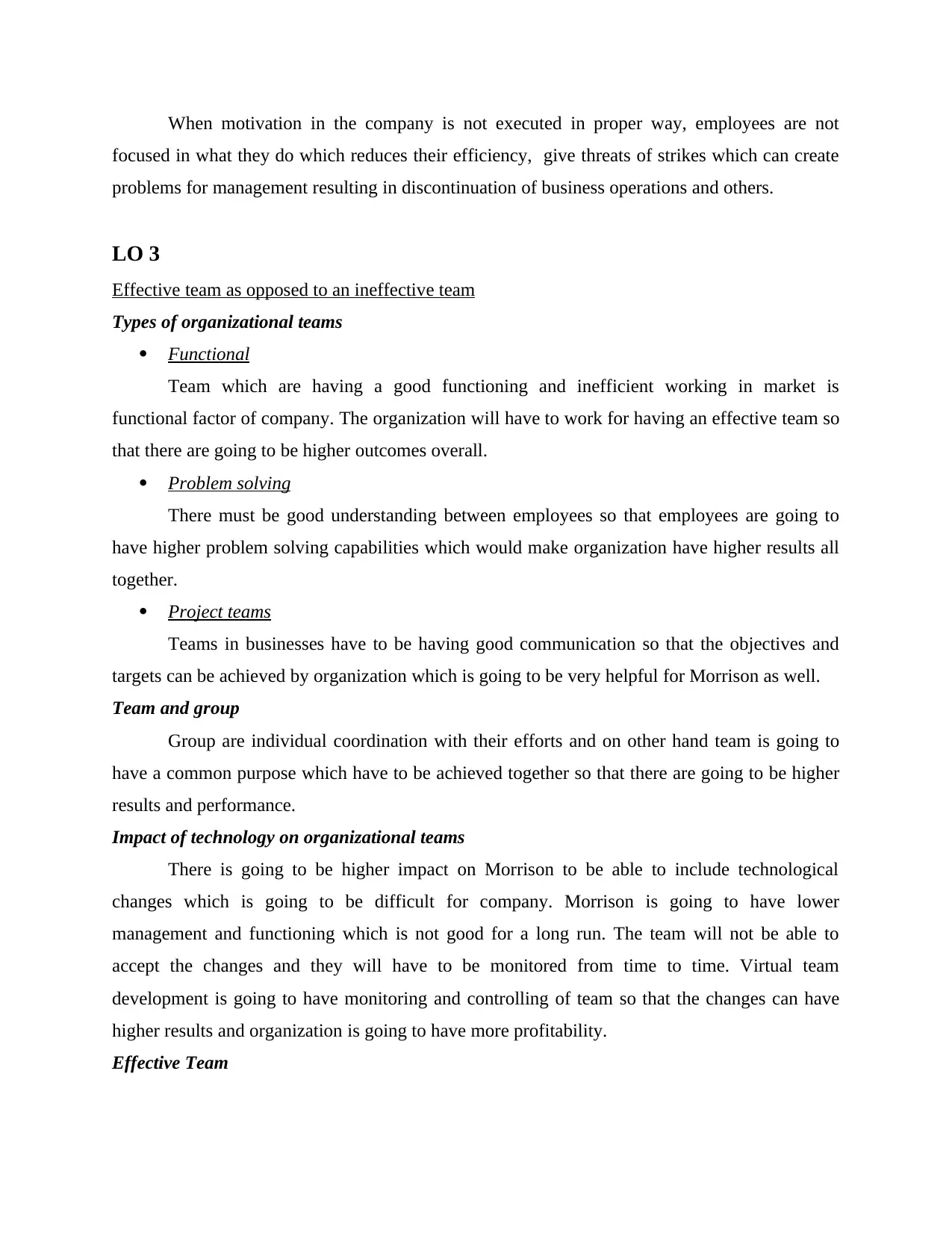
When motivation in the company is not executed in proper way, employees are not
focused in what they do which reduces their efficiency, give threats of strikes which can create
problems for management resulting in discontinuation of business operations and others.
LO 3
Effective team as opposed to an ineffective team
Types of organizational teams
Functional
Team which are having a good functioning and inefficient working in market is
functional factor of company. The organization will have to work for having an effective team so
that there are going to be higher outcomes overall.
Problem solving
There must be good understanding between employees so that employees are going to
have higher problem solving capabilities which would make organization have higher results all
together.
Project teams
Teams in businesses have to be having good communication so that the objectives and
targets can be achieved by organization which is going to be very helpful for Morrison as well.
Team and group
Group are individual coordination with their efforts and on other hand team is going to
have a common purpose which have to be achieved together so that there are going to be higher
results and performance.
Impact of technology on organizational teams
There is going to be higher impact on Morrison to be able to include technological
changes which is going to be difficult for company. Morrison is going to have lower
management and functioning which is not good for a long run. The team will not be able to
accept the changes and they will have to be monitored from time to time. Virtual team
development is going to have monitoring and controlling of team so that the changes can have
higher results and organization is going to have more profitability.
Effective Team
focused in what they do which reduces their efficiency, give threats of strikes which can create
problems for management resulting in discontinuation of business operations and others.
LO 3
Effective team as opposed to an ineffective team
Types of organizational teams
Functional
Team which are having a good functioning and inefficient working in market is
functional factor of company. The organization will have to work for having an effective team so
that there are going to be higher outcomes overall.
Problem solving
There must be good understanding between employees so that employees are going to
have higher problem solving capabilities which would make organization have higher results all
together.
Project teams
Teams in businesses have to be having good communication so that the objectives and
targets can be achieved by organization which is going to be very helpful for Morrison as well.
Team and group
Group are individual coordination with their efforts and on other hand team is going to
have a common purpose which have to be achieved together so that there are going to be higher
results and performance.
Impact of technology on organizational teams
There is going to be higher impact on Morrison to be able to include technological
changes which is going to be difficult for company. Morrison is going to have lower
management and functioning which is not good for a long run. The team will not be able to
accept the changes and they will have to be monitored from time to time. Virtual team
development is going to have monitoring and controlling of team so that the changes can have
higher results and organization is going to have more profitability.
Effective Team
Paraphrase This Document
Need a fresh take? Get an instant paraphrase of this document with our AI Paraphraser
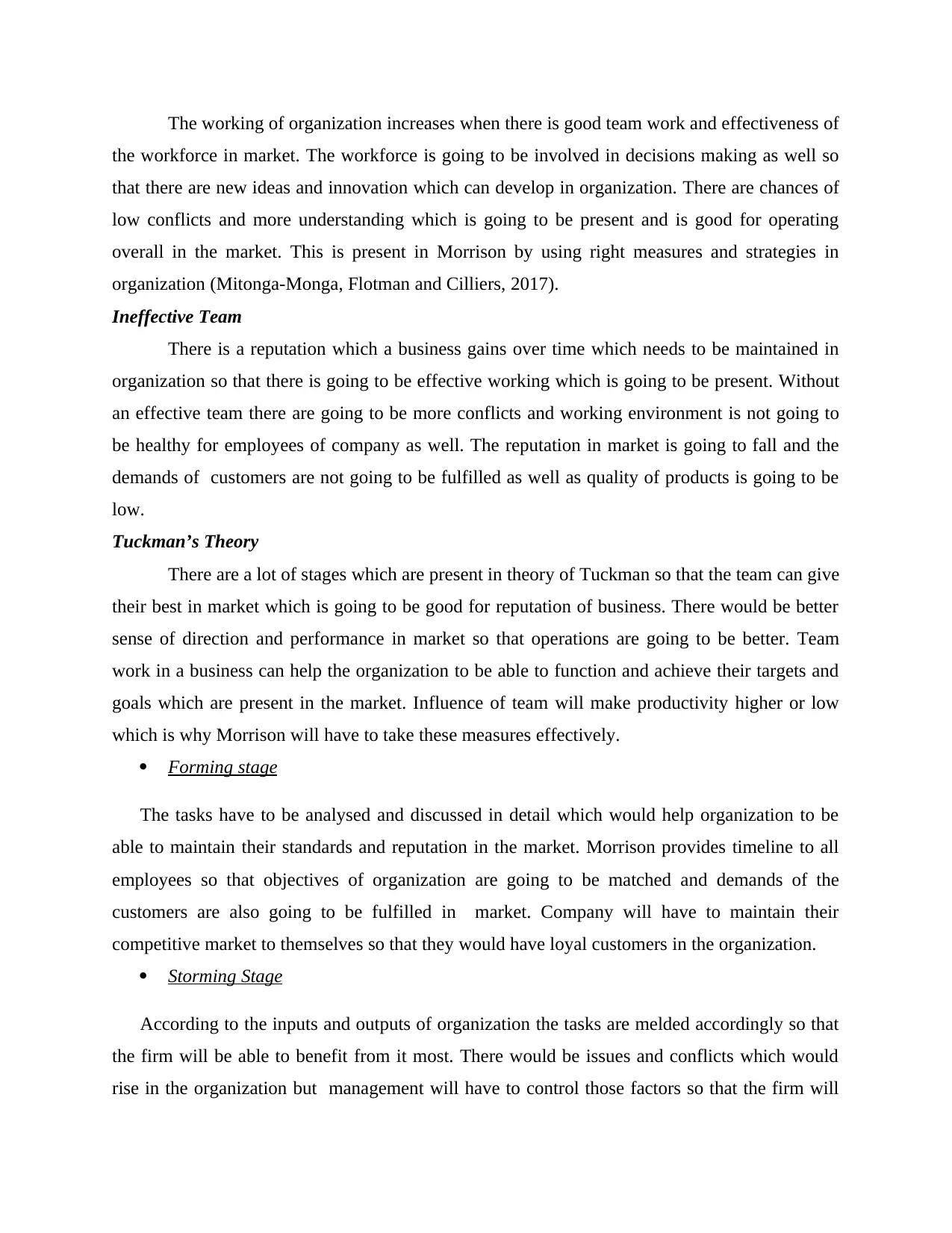
The working of organization increases when there is good team work and effectiveness of
the workforce in market. The workforce is going to be involved in decisions making as well so
that there are new ideas and innovation which can develop in organization. There are chances of
low conflicts and more understanding which is going to be present and is good for operating
overall in the market. This is present in Morrison by using right measures and strategies in
organization (Mitonga-Monga, Flotman and Cilliers, 2017).
Ineffective Team
There is a reputation which a business gains over time which needs to be maintained in
organization so that there is going to be effective working which is going to be present. Without
an effective team there are going to be more conflicts and working environment is not going to
be healthy for employees of company as well. The reputation in market is going to fall and the
demands of customers are not going to be fulfilled as well as quality of products is going to be
low.
Tuckman’s Theory
There are a lot of stages which are present in theory of Tuckman so that the team can give
their best in market which is going to be good for reputation of business. There would be better
sense of direction and performance in market so that operations are going to be better. Team
work in a business can help the organization to be able to function and achieve their targets and
goals which are present in the market. Influence of team will make productivity higher or low
which is why Morrison will have to take these measures effectively.
Forming stage
The tasks have to be analysed and discussed in detail which would help organization to be
able to maintain their standards and reputation in the market. Morrison provides timeline to all
employees so that objectives of organization are going to be matched and demands of the
customers are also going to be fulfilled in market. Company will have to maintain their
competitive market to themselves so that they would have loyal customers in the organization.
Storming Stage
According to the inputs and outputs of organization the tasks are melded accordingly so that
the firm will be able to benefit from it most. There would be issues and conflicts which would
rise in the organization but management will have to control those factors so that the firm will
the workforce in market. The workforce is going to be involved in decisions making as well so
that there are new ideas and innovation which can develop in organization. There are chances of
low conflicts and more understanding which is going to be present and is good for operating
overall in the market. This is present in Morrison by using right measures and strategies in
organization (Mitonga-Monga, Flotman and Cilliers, 2017).
Ineffective Team
There is a reputation which a business gains over time which needs to be maintained in
organization so that there is going to be effective working which is going to be present. Without
an effective team there are going to be more conflicts and working environment is not going to
be healthy for employees of company as well. The reputation in market is going to fall and the
demands of customers are not going to be fulfilled as well as quality of products is going to be
low.
Tuckman’s Theory
There are a lot of stages which are present in theory of Tuckman so that the team can give
their best in market which is going to be good for reputation of business. There would be better
sense of direction and performance in market so that operations are going to be better. Team
work in a business can help the organization to be able to function and achieve their targets and
goals which are present in the market. Influence of team will make productivity higher or low
which is why Morrison will have to take these measures effectively.
Forming stage
The tasks have to be analysed and discussed in detail which would help organization to be
able to maintain their standards and reputation in the market. Morrison provides timeline to all
employees so that objectives of organization are going to be matched and demands of the
customers are also going to be fulfilled in market. Company will have to maintain their
competitive market to themselves so that they would have loyal customers in the organization.
Storming Stage
According to the inputs and outputs of organization the tasks are melded accordingly so that
the firm will be able to benefit from it most. There would be issues and conflicts which would
rise in the organization but management will have to control those factors so that the firm will
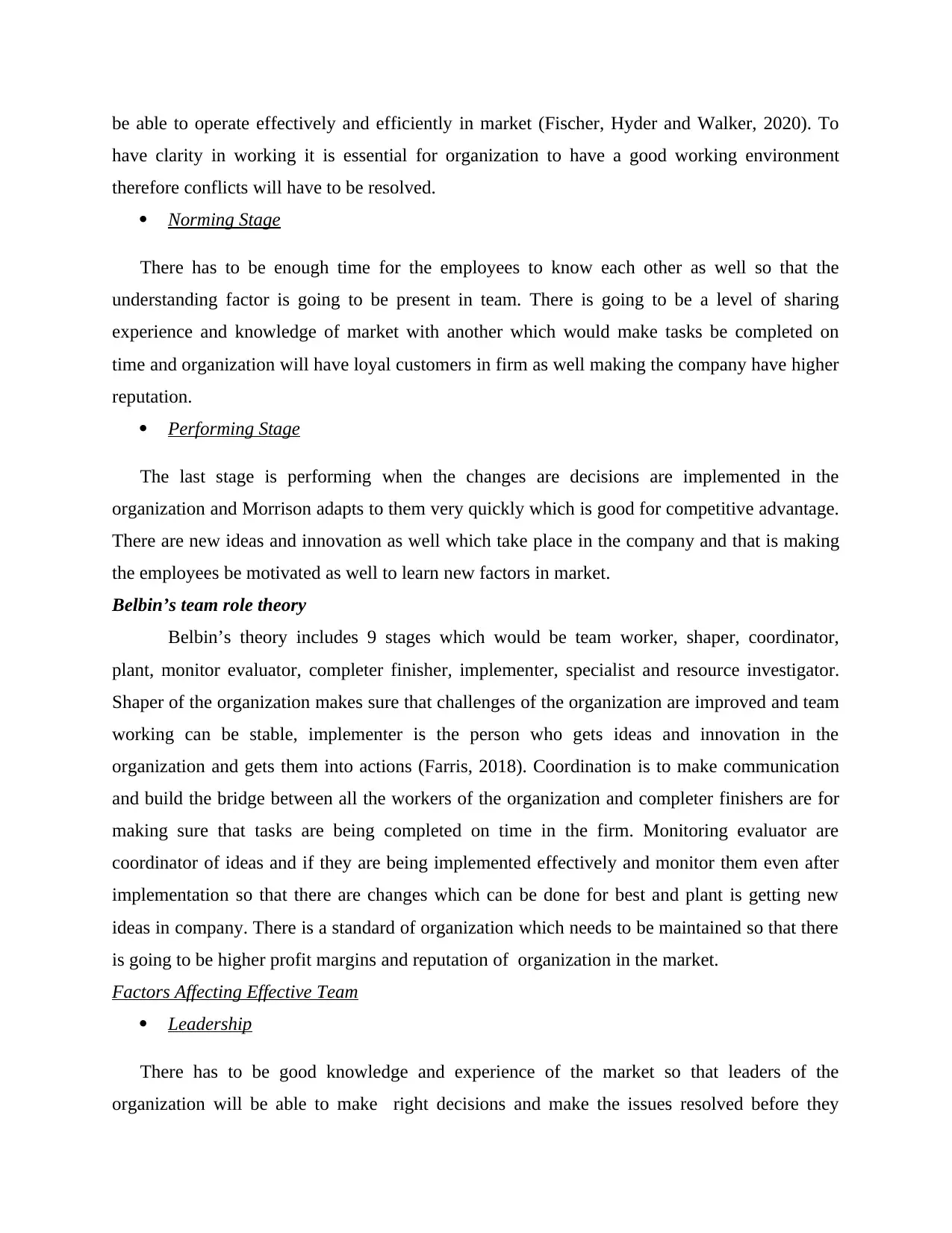
be able to operate effectively and efficiently in market (Fischer, Hyder and Walker, 2020). To
have clarity in working it is essential for organization to have a good working environment
therefore conflicts will have to be resolved.
Norming Stage
There has to be enough time for the employees to know each other as well so that the
understanding factor is going to be present in team. There is going to be a level of sharing
experience and knowledge of market with another which would make tasks be completed on
time and organization will have loyal customers in firm as well making the company have higher
reputation.
Performing Stage
The last stage is performing when the changes are decisions are implemented in the
organization and Morrison adapts to them very quickly which is good for competitive advantage.
There are new ideas and innovation as well which take place in the company and that is making
the employees be motivated as well to learn new factors in market.
Belbin’s team role theory
Belbin’s theory includes 9 stages which would be team worker, shaper, coordinator,
plant, monitor evaluator, completer finisher, implementer, specialist and resource investigator.
Shaper of the organization makes sure that challenges of the organization are improved and team
working can be stable, implementer is the person who gets ideas and innovation in the
organization and gets them into actions (Farris, 2018). Coordination is to make communication
and build the bridge between all the workers of the organization and completer finishers are for
making sure that tasks are being completed on time in the firm. Monitoring evaluator are
coordinator of ideas and if they are being implemented effectively and monitor them even after
implementation so that there are changes which can be done for best and plant is getting new
ideas in company. There is a standard of organization which needs to be maintained so that there
is going to be higher profit margins and reputation of organization in the market.
Factors Affecting Effective Team
Leadership
There has to be good knowledge and experience of the market so that leaders of the
organization will be able to make right decisions and make the issues resolved before they
have clarity in working it is essential for organization to have a good working environment
therefore conflicts will have to be resolved.
Norming Stage
There has to be enough time for the employees to know each other as well so that the
understanding factor is going to be present in team. There is going to be a level of sharing
experience and knowledge of market with another which would make tasks be completed on
time and organization will have loyal customers in firm as well making the company have higher
reputation.
Performing Stage
The last stage is performing when the changes are decisions are implemented in the
organization and Morrison adapts to them very quickly which is good for competitive advantage.
There are new ideas and innovation as well which take place in the company and that is making
the employees be motivated as well to learn new factors in market.
Belbin’s team role theory
Belbin’s theory includes 9 stages which would be team worker, shaper, coordinator,
plant, monitor evaluator, completer finisher, implementer, specialist and resource investigator.
Shaper of the organization makes sure that challenges of the organization are improved and team
working can be stable, implementer is the person who gets ideas and innovation in the
organization and gets them into actions (Farris, 2018). Coordination is to make communication
and build the bridge between all the workers of the organization and completer finishers are for
making sure that tasks are being completed on time in the firm. Monitoring evaluator are
coordinator of ideas and if they are being implemented effectively and monitor them even after
implementation so that there are changes which can be done for best and plant is getting new
ideas in company. There is a standard of organization which needs to be maintained so that there
is going to be higher profit margins and reputation of organization in the market.
Factors Affecting Effective Team
Leadership
There has to be good knowledge and experience of the market so that leaders of the
organization will be able to make right decisions and make the issues resolved before they
⊘ This is a preview!⊘
Do you want full access?
Subscribe today to unlock all pages.

Trusted by 1+ million students worldwide
1 out of 18
Related Documents
Your All-in-One AI-Powered Toolkit for Academic Success.
+13062052269
info@desklib.com
Available 24*7 on WhatsApp / Email
![[object Object]](/_next/static/media/star-bottom.7253800d.svg)
Unlock your academic potential
Copyright © 2020–2026 A2Z Services. All Rights Reserved. Developed and managed by ZUCOL.





